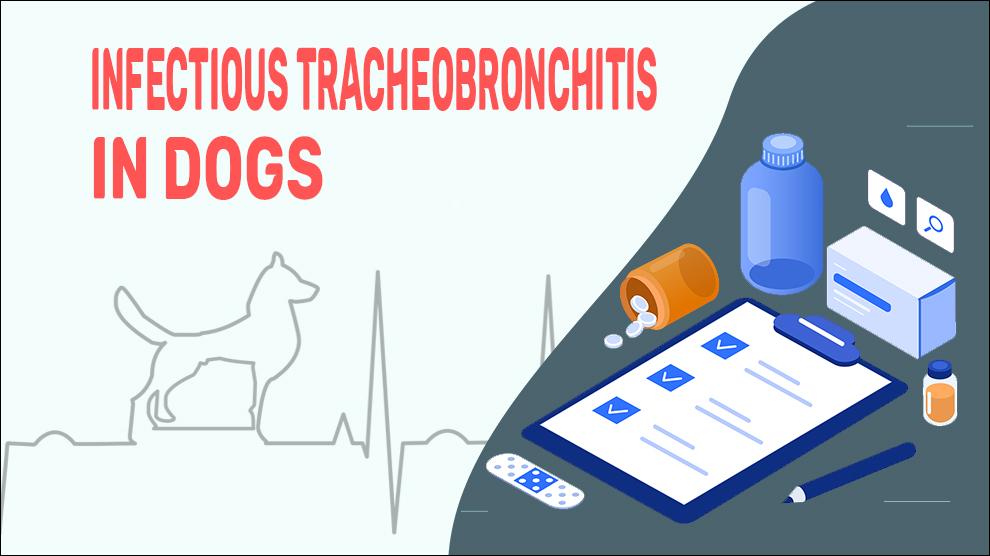Infectious tracheobronchitis is a highly contagious, multifactorial disease that results from acute or chronic inflammation of the bronchial airways and trachea. Canine infectious tracheobronchitis is often secondary to viral infection of the respiratory system.
It is a mild, self-limiting disease that normally improves on its own. However, sometimes it can progress to chronic bronchitis in weakened, debilitated, or aged dogs and fatal bronchopneumonia in puppies. The disease spreads rapidly among susceptible dogs housed in close confinement, such as grooming facility, rescue centers, kennels, or veterinary hospitals.
It is also referred to as Kennel cough, in fact, it is a broad term covering any infectious or contagious condition of dogs where coughing is one of the major clinical signs. ‘Infectious tracheobronchitis’ term suggests the location of the infection is the bronchial tubes and trachea (or 'windpipe').
Kennel cough can be caused by several viruses and bacteria, often at the same time. Since kennel cough can be caused by several pathogens and with the possibility of co-infections (i.e. infection with more than one bacterial or viral agent), it is often mentioned as the Canine Infectious Respiratory Disease Complex (CIRDC)
Symptoms Of Infectious Tracheobronchitis
- Acute onset of a nonproductive cough
- Loud cough (describe as a 'goose honk')
- Rapid/labored breathing
- Fever
- Runny eyes and nose
- Loss of appetite
- Swollen tonsils
- Wheezing
Severe cases
- Dogs try to clear their throat or spit up or gag, often mistaken as vomiting.
- Bronchopneumonia
- Tachypnea
- Respiratory distress
- Pyrexia
Treatment Options For Infectious Tracheobronchitis
There is no specific treatment available for infectious tracheobronchitis in dogs.
- There is no specific treatment for infectious tracheobronchitis and most of the cases resolve without treatment (like the Common Cold in humans)
- Intravenous fluid and nutritional therapy may be given to help your dog if it becomes severely dehydrated.
- Your vet keeps your dog hydrated and only treats the symptoms while the virus runs its course.
- immunosuppressive or anti-inflammatory medications
- A broad-spectrum antibiotic for any secondary bacterial infections from occurring
- cough suppressants (Balminil, Benylin, Delsym, Robitussin)
Home Remedies For Infectious Tracheobronchitis
- Keep the affected dog in isolation and after they are deemed recovered for at least few more weeks.
- Make sure that your dog gets appropriate vaccinations.
- Limit the exposure of puppies to other dogs that may be infected or carrying the virus until they have completed their puppy vaccination series.
- It is advisable to keep your dog’s bedding clean and sterile.
Prevention Of Infectious Tracheobronchitis
Vaccination guidelines:
Considering the risk factors facing your pet, check with your vet how often your dog should get kennel cough shots - it’s vital that your pups get the right vaccines at the right time.
Bordetella Vaccine –
- First vax (6-8 weeks)
- Second vaccination (10-12 weeks)
- Intranasal and oral kennel cough shots – every 1 year
- The booster shots are effective for one year.
Affected Breeds Of Infectious Tracheobronchitis
There is no breed disposition.
Boxer, Small Dog Breeds, Large Dog Breeds
Additional Facts For Infectious Tracheobronchitis
Incubation period: 3–7 days (with a range of 2–10)
Transmission:
- aerosolization of microdroplets of respiratory secretions.
- Oronasal contact with other dogs (most common) or fomites and caregivers(less common)
Bacteria
- Streptococcus Equi (subspecies zooepidemicus)
- Mycoplasmas (Mycoplasma cynos)
- Bordetella bronchiseptica
Canine viruses
- Adenovirus 2
- Distemper virus
- Parainfluenza virus
- Bocavirus
- Influenza virus
- Coronavirus (pantropic strain)
- Respiratory coronavirus
- Pneumovirus
- Hepacivirus
- Herpesvirus
- Reovirus
Morbidity:
- Canine influenza virus and canine distemper virus infection symptoms start off with symptoms similar to Kennel cough.
- Signs vary from loud cough and slight fever to hemorrhagic viral pneumonia
- Most viruses are cleared in 7- 15 days, but sometimes, clinical signs may last for even weeks.
Mortality:
Young dogs have the highest mortality rate (usually it ranges from 1%–to 5%)
- Unspecified disease or failure (0.4%)
- Pneumonia (0.3%)
- Laryngeal paralysis (0.2%)
- Tracheal collapse (0.1%)
- Bronchitis (0.1%)
Vaccine:
- vaccination should be done at the right time prescribed by the vet
- Vaccination should be continued in the places that have periodic outbreaks (from wild and feral hosts)
Prognosis:
In most cases, Kennel cough has a good prognosis as it is usually a mild disease.
The dog will recover without treatment in 3 weeks and it is typically able to continue with daily activities. Sometimes, the disease can linger for up to 6 weeks and run its course.
When To See A Vet
Contact your vet right away, if you notice any of the following:
- If your dog doesn't improve within the expected amount of time, Make sure to follow up with your veterinarian.
- Ongoing kennel cough infection, when it becomes serious can lead to pneumonia.
- If your dog at any time has symptoms of Tachypnea, listlessness or continued fever
Food Suggestions For Infectious Tracheobronchitis
- Low-carb dog food/peas, sweet potatoes, squash, yams, pumpkin, etc.
- Fresh, lean protein (Lean ground beef, White-meat skinless chicken or turkey)
- Antioxidants- Blueberries, blackberries, Steamed broccoli, spinach, cooked yellow squash, kale, and green beans.
- Iron: lean meats like ground beef and lamb, fish, such as sardines and salmon, pumpkin, carrots, and leafy greens.
- Vitamin C and bioflavonoids: Brussel sprouts, spinach, broccoli, kale, pineapple, papaya, strawberries, etc
Conclusion
While most cases of ‘infectious tracheobronchitis’ will resolve without treatment, medications may minimize symptoms or speed recovery during the course of infection.
When potential exposure cannot be avoided, proper vaccination can prevent or reduce the symptoms, decrease the duration of the illness and prevent the spread.
Regular health checks are recommended to ensure there are no secondary infections.

















